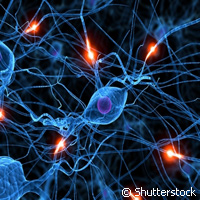Researchers uncover proteins behind over 130 brain diseases
Scientists have identified a set of over 1,400 proteins in the human brain that are behind over 130 diseases. The findings, published in the journal Nature Neuroscience, could lead to new treatments for various disorders. In addition, the study sheds light on the evolutionary origins of human behaviour. The work was partly funded by the EU. The newly discovered proteins are all found in a structure called the postsynaptic density (PSD). Synapses are the junctions that connect one nerve cell to another. The PSD is a part of the synapse and consists of large numbers of proteins that are bound tightly together. Research in animals has implied that the PSD may be involved in a number of diseases as well as certain aspects of behaviour. However, the human PSD has been little studied. In this study, scientists in the UK probed PSDs taken from nine adults undergoing brain surgery. Their efforts revealed that the human PSD is made up of 1,461 proteins, each of which is encoded by a different gene. Furthermore, mutations in many genes coding for PSD proteins turn out to be behind 133 neurological and psychiatric diseases. In fact, one seventh of the proteins identified are involved in a known clinical disorder, and over half of these are repeat offenders. To facilitate the analysis of the complex web of proteins, the researchers created a molecular roadmap that maps the links between the proteins and different diseases. 'We found that over 130 brain diseases involve the PSD - far more than expected. These diseases include common debilitating diseases such as Alzheimer's disease, Parkinson's disease and other neurodegenerative disorders as well as epilepsies and childhood developmental diseases including forms of autism and learning disability,' commented Professor Seth Grant of the Wellcome Trust Sanger Institute. 'Since many different diseases involve the same set of proteins we might be able to develop new treatments that could be used on many diseases. We also can see ways to develop new genetic diagnostic tests and ways to help doctors classify the brain diseases.' Furthermore, many of the genes involved in the PSD are key to many aspects of behaviour including learning and memory, emotion and mood, addiction and drug abuse. The researchers were also keen to learn how the genes behind the PSD proteins have evolved over time. To do this, they compared the sequence of human PSD genes with those of fellow primates chimpanzees and macaques as well as mice and rats, which are only distantly related to humans. Their analyses demonstrated that the PSD genes, and by extension the proteins they encode, have evolved at a much slower rate that other genes. The scientists suspect that this may be because of the high level of interactions between different PSD proteins. According to the team, slower rates of evolution have been found for other proteins with many interactions. 'The conservation of the structure of these proteins suggests that the behaviours governed by the PSD and the diseases associated with them have not changed much over many millions of years,' said Professor Grant. 'It also shows that synapses in rodents are much more similar to humans that we expected, showing that mice and rats are suitable models for studying human brain disease.' The scientists have made their data publicly available on the website of the Genes to Cognition programme, which is working to boost our understanding of the molecular basis of behaviour and brain disease.
Countries
United Kingdom



